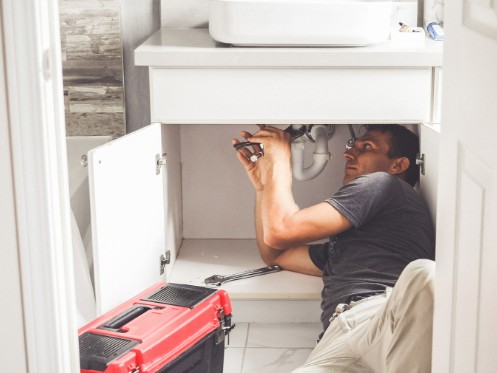Plumbing problems are often a source of stress and anxiety. You know you need a plumber, and you worry about the cost. Slow-draining fixtures are a typical example of a plumbing problem many homeowners face at some time or another. There are many causes for drains emptying slowly and a handful of ways to prevent this problem from occurring. At Christian Brothers Air Conditioning Plumbing Electrical, our primary goal is customer satisfaction with high-quality services. We also believe in helping our customers make wise decisions for their home and plumbing systems in hopes they may never even need us for emergency situations. Read on for information on what causes slow drains and tips on preventing a call to the plumber in the first place.
What Causes Slow Drains?
Slow drains around the house, from the kitchen sink to the toilet, can have dozens of causes. Some causes might be preventable with proper understanding and knowledge. Others are due to time, wear and tear, and even nature and may not be preventable. Preventing a slow drain or clogged pipe can be done in some circumstances. However, you may need special equipment, special knowledge, or even a licensed professional plumber to resolve them.
Slow Sinks Caused by Things That Shouldn’t Be There
One of the biggest reasons for a slow or clogged kitchen sink drain is washing down food or other items that belong in the trash. Some food items seem harmless to wash down the sink, as they are small. However, this isn’t always the case, as some foods will clump together or linger in your drains or pipes, eventually leading to a clog. Even with a garbage disposal, some food items are unsafe to wash down the sink.
Here are some examples of food that shouldn’t be put in a garbage disposal because they often cause your sink pipes to drain slowly. Eggshells the sticky membrane that lines the inside of the shell stick to your drain and pipes, collecting other debris along the way. Coffee grounds clump together rather than splitting apart when washed down the drain, forming a mass. Hot grease and cooking oil when it cools, the grease or oil will harden inside your pipes and form a clog. Never pour hot grease or oil down the sink, even with hot running water. Flour clumps together with water forming a thick, gooey substance. Meat bones the irregular and large shapes and pointed edges may get stuck in your pipes. Bones should never be put in the sink, even with a garbage disposal.
Flushing Non-Flushable Items in the Toilet
You may look at your toilet drain and think it is large enough to handle bigger items. However, the pipes narrow after the toilet, and certain things will still get stuck. One of the most common reasons for a sewer backup is from flushing things you shouldn’t down the toilet. This is especially true for misleading items that are marketed as flushable. Human waste and toilet paper are the only things that should ever be flushed.
Examples of things you should never flush down the toilet:
- Feminine hygiene products
- Flushable and non-flushable wipes
- Paper towels, cotton balls, and cotton swabs
- Clumps of hair
- Flushable kitty litter
Sewer Obstruction
If you have multiple slow drains in your home, this could be a sign of more serious problems. If your sewer system is blocked or clogged, it could affect all the drains in your home. Some sewer obstructions are caused by putting things down the drains that you shouldn’t, while others are caused by nature and time. In addition to multiple slow drains or back-ups, you may also notice a gurgling sound or other strange noises coming from your drains. This is a sign that you need a professional to take a look at your sewer system.
Causes of sewer obstruction:
- Broken pipes
- Debris buildup
- Tree roots and plants
- Sagging sewer lines
Preventing Slow Drains
Preventative steps can lower your risk of slow drains and clogs. There are some basic things you can do in your daily life to expand the lifespan of your drains and pipes.
Kitchen Sink Drains
Avoid washing foods down the kitchen sink. As discussed earlier, some foods are prone to collecting in the drain and causing blockages. Utilize your garbage disposal when appropriate. For foods that should not be put in the garbage disposal, toss them out or compost them. Hot grease and oil are especially dangerous to your plumbing system. Never pour this down the sink, even with running hot water. Instead, pour it into a jar, wait for it to cool and harden, then toss it out. Use a mesh strainer for your kitchen drains. The strainer will catch food before it goes down into the plumbing, saving you costly repairs in the future.
Shower and Bathroom Sink
Hair is the number one culprit in plugging a bathtub drain. Sometimes we can’t stop hair from going down the train, but we can try to lower the amount that washes away into our pipes. Regularly clean your bathtub drain, pulling out hair that you can reach. Use a hair trap in your bathtub to catch the hair before it goes down the drain.
Professional Drain Cleaning
Professional drain cleaning is a service you should have performed regularly to ensure anything that is stuck down in your drain and pipes is cleared away. Having the drains cleaned prevents future blockages, leading to healthy, free-flowing drains. A professional plumber will inspect your drains for any obstructions. The plumber uses hydro-jetting or other equipment to essentially power wash the inside of your pipes, dislodging small clumps and clogs. If a mass is found in your pipes that can be removed with cleaning, the plumber will remove it by replacing pipes and drains.
Sewer System Inspection
Professional sewer system inspection should be performed routinely, about every 3-5 years. By having your system inspected by a licensed plumber, you can catch problems before they result in a massive plumbing emergency. A professional plumbing company will use a scope with a camera attached to look through your sewer lines, observing for any signs of blockage or damage. This inspection will identify any weaknesses in your system as well as any debris that needs to be removed. Your plumber will discuss the condition of your sewer system with you after the inspection and make recommendations to keep your system healthy.
Now that you have a better understanding of drains, you should be able to avoid some situations. However, there are always times when prevention and maintenance aren’t enough and you find yourself in need of a professional. Never try and fix a clogged drain on your own. You could cause further damage, resulting in even more costly repairs.
When You Need a Drain Cleaned Call Christian Brothers Air Conditioning Plumbing Electrical
When you have slow drains or clogs that need to be addressed, count on the professionals at Christian Brothers Air Conditioning Plumbing Electrical in Phoenix to get your pipes running clean and clear again.










